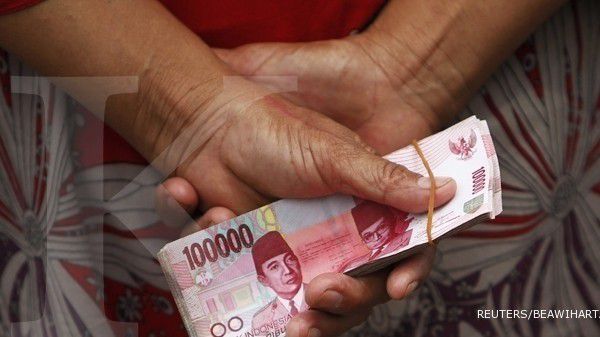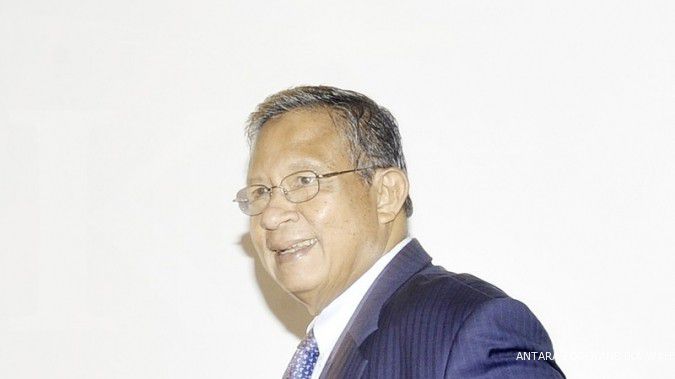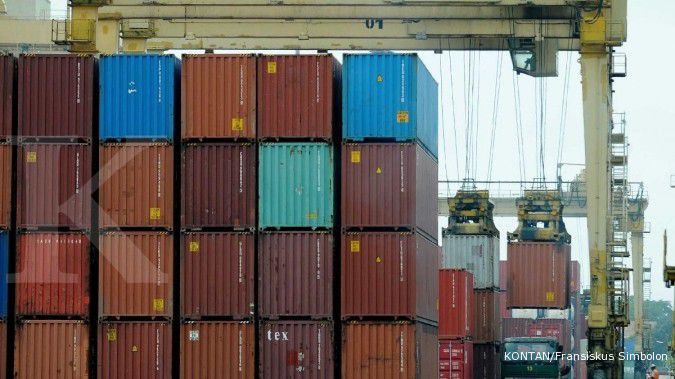JAKARTA. Bank Indonesia (BI) predicts that the rupiah (Rp) will stay at about Rp 12,000 per US dollar at least until the end of 2015 as uncertainty in the global economy will continue to affect the world’s financial markets. Speaking during a hearing with members of the House of Representatives on Tuesday, BI Governor Agus Martowardojo said that he believed the rupiah would remain in the range of 11,900 to 12,100 throughout next year. “The global risk here is the normalization of the US interest rate, which could affect our economy through both the financial and trade channels,” Agus said during the meeting, which focused on the 2015 state budget. Finance Minister Chatib Basri, who also joined the discussion, said that the government would set the rupiah assumption in next year’s budget between 11,500 and 12,000, on the back of the prospect of tighter global liquidity driven byan expected increase in US interest rates. The Indonesian central bank has predicted the US Federal Reserve funds rate — the benchmark interest rate in the US economy, which currently stands at a mere 0.25 percent — would increase by 50 basis points in the third quarter next year and by another 25 basis points in the fourth quarter, according to BI Deputy Governor Perry Warjiyo. An increase in the Fed funds rate would make US assets more attractive, a situation that would trigger capital outflows and increase global demand for dollars, which could hurt currencies in emerging economies, including Indonesia. On the domestic side, bearish sentiment surrounding the rupiah is also stoked by the likelihood that Indonesia will see only minor improvement in its external balance. The country’s current-account deficit, a major worry among investors, would narrow only to 2.5 percent of gross domestic product (GDP) in 2015, from the estimated 3 percent this year, according to Perry. “We will still post a deficit in the current account next year, though it will be on a smaller scale than this year,” the BI deputy governor said. “So, the pressure [on the rupiah] from the current-account deficit will still be there.” The rupiah onshore rate fell to 12,000 per dollar on Tuesday, the weakest level since Feb. 13, according to the Jakarta Interbank Spot Dollar (JISDOR). That means the currency is heading to become Asia’s worst-performer in the April-June period, reversing its fortune as the rupiah was the region’s best months earlier, appreciating by 7 percent in the first quarter. The rupiah fell to 12,027 on June 18 on the back of concerns that resurgent conflict in Iraq would drive up oil prices, thus inflating Indonesia’s oil imports and worsening the current-account deficit. The weak rupiah could also trigger a vicious cycle of deterioration in Indonesia’s economic fundamentals. According to Finance Ministry estimates, every 100 basis points of rupiah depreciation will add at least $300 million to the fiscal burden, as the weak currency will again swell oil imports and fuel subsidies. In 2015, any depreciation of the rupiah is likely to be “gradual”, in line with the expected gradual narrowing of the current-account deficit next year, said Jennifer Kusuma, a currency strategist with BNP Paribas. The France-based bank predicted the rupiah would weaken to 12,250 against the dollar in the first six months next year, before falling further to 12,800 by the end of the year as the US central bank would start hiking its key interest rate in the second half of 2015. For the currency’s short-term outlook in 2014, however, the sentiment is positive for the rupiah as the currency will likely be propped up by Indonesia’s better trade data in the coming months, she argued. BI and the Finance Ministry have predicted that the country’s trade balance would be in surplus in May, overturning the latest $1.9 billion trade deficit that the country registered in April. “Seasonally weaker balance of payments and current-account deficit are largely priced in,” Jennifer wrote in a text message from Singapore on Tuesday. “In fact, foreign investors are looking to fade the rupiah weakness around these levels.” (Satria Sambijantoro)
Rp to stay at 12,000 per dollar until 2015
JAKARTA. Bank Indonesia (BI) predicts that the rupiah (Rp) will stay at about Rp 12,000 per US dollar at least until the end of 2015 as uncertainty in the global economy will continue to affect the world’s financial markets. Speaking during a hearing with members of the House of Representatives on Tuesday, BI Governor Agus Martowardojo said that he believed the rupiah would remain in the range of 11,900 to 12,100 throughout next year. “The global risk here is the normalization of the US interest rate, which could affect our economy through both the financial and trade channels,” Agus said during the meeting, which focused on the 2015 state budget. Finance Minister Chatib Basri, who also joined the discussion, said that the government would set the rupiah assumption in next year’s budget between 11,500 and 12,000, on the back of the prospect of tighter global liquidity driven byan expected increase in US interest rates. The Indonesian central bank has predicted the US Federal Reserve funds rate — the benchmark interest rate in the US economy, which currently stands at a mere 0.25 percent — would increase by 50 basis points in the third quarter next year and by another 25 basis points in the fourth quarter, according to BI Deputy Governor Perry Warjiyo. An increase in the Fed funds rate would make US assets more attractive, a situation that would trigger capital outflows and increase global demand for dollars, which could hurt currencies in emerging economies, including Indonesia. On the domestic side, bearish sentiment surrounding the rupiah is also stoked by the likelihood that Indonesia will see only minor improvement in its external balance. The country’s current-account deficit, a major worry among investors, would narrow only to 2.5 percent of gross domestic product (GDP) in 2015, from the estimated 3 percent this year, according to Perry. “We will still post a deficit in the current account next year, though it will be on a smaller scale than this year,” the BI deputy governor said. “So, the pressure [on the rupiah] from the current-account deficit will still be there.” The rupiah onshore rate fell to 12,000 per dollar on Tuesday, the weakest level since Feb. 13, according to the Jakarta Interbank Spot Dollar (JISDOR). That means the currency is heading to become Asia’s worst-performer in the April-June period, reversing its fortune as the rupiah was the region’s best months earlier, appreciating by 7 percent in the first quarter. The rupiah fell to 12,027 on June 18 on the back of concerns that resurgent conflict in Iraq would drive up oil prices, thus inflating Indonesia’s oil imports and worsening the current-account deficit. The weak rupiah could also trigger a vicious cycle of deterioration in Indonesia’s economic fundamentals. According to Finance Ministry estimates, every 100 basis points of rupiah depreciation will add at least $300 million to the fiscal burden, as the weak currency will again swell oil imports and fuel subsidies. In 2015, any depreciation of the rupiah is likely to be “gradual”, in line with the expected gradual narrowing of the current-account deficit next year, said Jennifer Kusuma, a currency strategist with BNP Paribas. The France-based bank predicted the rupiah would weaken to 12,250 against the dollar in the first six months next year, before falling further to 12,800 by the end of the year as the US central bank would start hiking its key interest rate in the second half of 2015. For the currency’s short-term outlook in 2014, however, the sentiment is positive for the rupiah as the currency will likely be propped up by Indonesia’s better trade data in the coming months, she argued. BI and the Finance Ministry have predicted that the country’s trade balance would be in surplus in May, overturning the latest $1.9 billion trade deficit that the country registered in April. “Seasonally weaker balance of payments and current-account deficit are largely priced in,” Jennifer wrote in a text message from Singapore on Tuesday. “In fact, foreign investors are looking to fade the rupiah weakness around these levels.” (Satria Sambijantoro)





